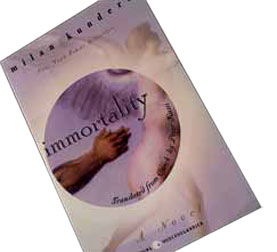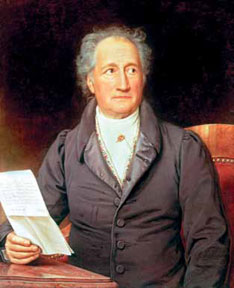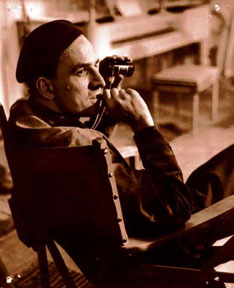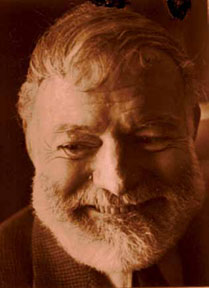Kunderian conception of immortality
By Dilshan BOANGE
|

Immortality by Milan Kundera
|
Despite all that one achieves either individually or collectively,
within one's life time or the entire narrative of human civilisation,
man can be defined essentially through one word -'mortal'. It is what
effectively differentiates man from what is conceived as divine and
eternal. Death, and the erasure from human memory, through the passage
of time is painful to man, yet it is the one thing that man is powerless
to stop in spite of all the technological conquests accomplished over
millennia.
The novel Immortality
|

Johann von Goethe |
It is this concept of mortality and its antithesis -'immortality'
which Czech born writer Milan Kundera grapples with in his highly
celebrated novel Immortality. Written originally in Czech, this novel is
more philosophical than some of his previous works which have more
marked overtones of politically themed schema. Kundera develops his
thesis in the course of the novel's narrative that alters between
different characters (and storylines) who are not always linked through
a cohesive spectrum of time and space. While the main plotline in
Immortality is based on the character of the woman named Agnes, there
are subplots that run a course that doesn't contribute to the direct
development of the principal storyline yet is bound thematically; the
theme being of course the concept that rings out loud from the one
worded title -Immortality.
The freedoms that Kundera has afforded himself in the course of
crafting his novel need to be noted for the many boundaries broken in
terms of the more conventional form(s) of the novel. And it is this very
laxity in conventionalism one may suppose has allowed him to develop a
bold technique of story narrative. Kundera's appropriation of historic
characters to serve the purposes of his narratives can be noted in more
than one of his works, and Immortality is one such example that deftly
employs this method of resurrection of historic figures and placing them
in scenarios to serve his novel's purpose.
The German playwright and poet Johann von Goethe is considered one of
the greatest figures in European art and culture who no doubt occupies
an inerasable place. The American Nobel laureate in literature Ernest
Hemingway is one of the foremost figures in defining the age of
modernist fiction writing who cannot be disregarded in terms of modern
literature. Can anyone conceive any possible scenario where these two
figures may meet and discuss matters of great philosophical depth in
real life? Yet imagine what possible great dialogues could arise were
such historic figures, whose lives were wide apart from each other's
place in chronology, were to meet? This is the kind of transgressions
that Kundera presents in Immortality to build his thesis through
dialogues between two colossal figures in the world of art and
literature.
Dialogues of Goethe and Hemingway
|

Ingmar Bergman. |
The conversations of Goethe and Hemingway take place in the afterlife
and are in my opinion one of the most central elements that expound the
author's conceptions of immortality spoken through two persons whose
legacy is virtually immortal.
The diverse narrative of storylines in the novel bring out subtle
indications of how the author presents his notions of what elements of a
person would remain unaffected by the ravages of time, yet none make
these conceptions as pronouncedly felt and delivered as the storyline
that deals with the last phase of Goethe's life when his edification is
being planned by his townsmen which runs alongside the love affair the
great poet embarks on with a young woman by the name of Bettina whose
advances were for the purpose of gaining some semblance of immortality
herself via Goethe. It is this storyline that progresses to the
afterlife of Goethe who presents philosophical dialogues with the great
American novelist Hemingway.
A number of tenets are presented through what are the sentiments of
artists who may become daunted (after a certain point) of society's
claim over them even once they are no more amongst the living. Hemingway
confides in Goethe how disturbed he is over the untruths that are being
said of him in the world and in effect rewriting his life through books
being written about him. And the obvious inability of Hemingway to set
the 'record straight' being in the afterlife, becomes a matter that is
not only infuriating but also oppressive. The judgmental ways of the
world over his image, his reputation, his legacy, haunts him. Goethe
having listened to Hemingway's short outburst speaks as a pacifier and
explains to Hemingway that is the nature of 'immortality' and says
-"Immortality means eternal trial."
Becoming possessed by the public
|

Ernest Hemingway |
When Hemingway objects to the way in which this eternal trial that is
going on in the world of the living seems to have no fair judge but a
"narrow-minded school teacher with a rod in her hand" Goethe points out
that as the unfortunate state of immortality, which has no fair
judgment. Goethe too adds to the conversation by confiding in Hemingway
his own experience of being made fearful of the judgmental gazes of
society, by narrating a dream he had once had. In it he says he was
performing the role of a puppeteer presenting a puppet theatre rendition
of his famed play Faust. What is remarkable in this scenario is that
Goethe says the audience had at one point vacated their seats and was
later seen at the back of the stage inquisitively staring at Goethe and
his movements and seemed utterly disinterested about the play.
Then the crowd had begun following him home and was staring at him
through the window to his room with their faces pressed against the
glass. The actions sound very much like fanfare that had obviously
turned bothersome and evidently unnerving. The lesson this story teaches
us is that the characters of Goethe and Hemingway (who vehemently
confesses in the conversations that he did not seek 'immortality')
desired their works, creations, to be appreciated but not for themselves
to become the 'objectified' and be made the curiosities of a public that
can at times become mercilessly censorious.
Clearly they are artists who sought appreciation for their works and
not glorification of them which would be the case of modern day
commercialization related to art -the artists is 'marketed' as an object
of public attention just as much as the work of art!
The price of 'immortality'
Goethe explains to Hemingway that the price he has been made to pay
for writing so many books is 'immortality'. It is in effect becoming a
victim of one's own fame where the ownership of how one's identity is
crafted in the eyes of the public tends to be taken well out of the
hands of the artist and takes on a socially controlled scheme. In the
course of the conversations between Goethe and Hemingway one of the
chief truths about human nature is revealed by Goethe as man not knowing
how to be 'mortal'.
This may come as somewhat ironic seeing as hot it is after all one of
the most basic definitive aspects of the being human. The crux of the
argument lies in what the novel's narrative expounds in the course of
its main plot and subplots, which is man's obsession to perpetuate
himself in the memory of people to ensure something of himself will
continue once the physical being is no more.
Kundera goes on to say that it is artists and politicians who are
obsessed with the need to edify themselves in some way, which is a
pursuit of 'immortality'. What is the price of seeking immortality? The
novel appears to suggest that involuntary surrender of one's self to the
great continuum of human memory seems a plight that is unavoidable to
ones such as Goethe and Hemingway. And society after taking possession
of such a person's 'image' will make it an object of marvel and wonder
and thereby seek to (in time) shape it in newer moulds to keep it public
attention worthy -an object to be handled.
Perhaps that is the price of immortality as Kundera seems to suggest.
It is the state of losing the right to one's self.
And I cannot help but feel that some notion of this advocacy must
have been felt by the great European film maker Ingmar Bergman who once
said in an documentary interview that he wished, like the builders of
the great European cathedrals (whose names have been lost to history
though their creations continue to marvel generations) he too could have
remained in anonymity. |

